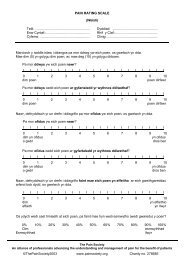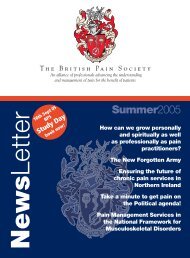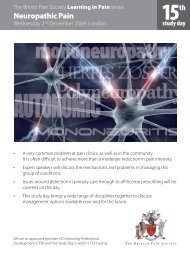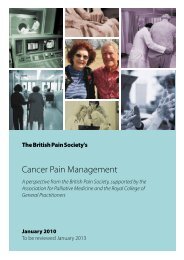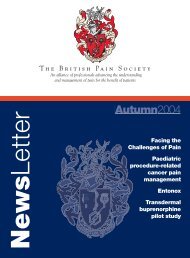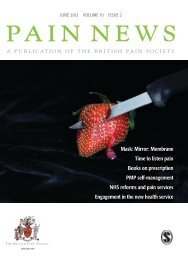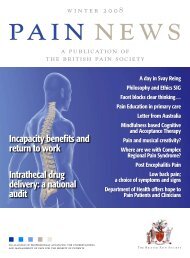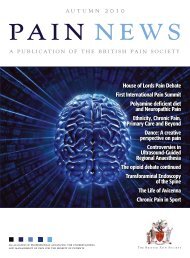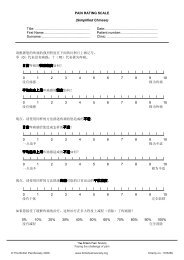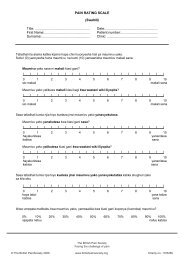Summer 2010 - The British Pain Society
Summer 2010 - The British Pain Society
Summer 2010 - The British Pain Society
You also want an ePaper? Increase the reach of your titles
YUMPU automatically turns print PDFs into web optimized ePapers that Google loves.
advice in uncertain or complex<br />
cases.<br />
• Use case history examples<br />
of good and poor practice to<br />
illustrate your points (some<br />
examples will be available<br />
from BPS this year)<br />
• Contact the Accountable<br />
Officer in your Trust or PCT<br />
• Work with your pharmacy<br />
department to promote good<br />
practice.<br />
<strong>The</strong>se are some simple practical<br />
ideas; good practice is explained<br />
in the guidance. As pain specialists<br />
we are also opioid specialists,<br />
referred to by NICE in this context<br />
in both the Low Back <strong>Pain</strong> guidance<br />
(CG88) 4 and Neuropathic <strong>Pain</strong>:<br />
pharmacological management in a<br />
non-specialist setting (CG96) 5 .<br />
This is our opportunity to<br />
disseminate our knowledge and<br />
to prevent problems for future<br />
generations.<br />
PROFESSIONAL PERSPECTIVES<br />
References<br />
End of Life Choices?<br />
Following the attempt by Jeremy<br />
Purvis to introduce a Member’s<br />
Bill on assisted dying interest in<br />
Scotland, prominent MSP Margo<br />
MacDonald has introduced an<br />
“End of Life Choices (Scotland)<br />
Bill” into Scottish Parliament. Ms<br />
MacDonald with the assistance<br />
of Christina Chen, Peter Warren<br />
1. Opioids for persistent pain:<br />
good practice. http://www.<br />
britishpainsociety.org/<br />
pub_professional.htm#opioids<br />
2. Katz N, Mazer N. <strong>The</strong><br />
impact of opioids on the<br />
endocrine system. Clin J <strong>Pain</strong><br />
2009;25(2):170-175<br />
3. McCracken L, Vellerman<br />
SC, Eccleston C. Patterns of<br />
prescription and concerns<br />
about opioid analgesics for<br />
chronic non-malignant pain<br />
in general practice. Primary<br />
Health Care Research and<br />
Development 9 (2008):146-156<br />
4. Early management of persistent<br />
non specific low back pain.<br />
http://guidance.nice.org.uk/<br />
CG88<br />
5. Neuropathic pain: the<br />
pharmacological management<br />
of neuropathic pain in adults in<br />
non-specialist settings<br />
http://guidance.nice.org.uk/<br />
CG96<br />
and the Scottish Parliament’s<br />
Non-Executive Bills Unit, has the<br />
support of 18 MSPs to introduce<br />
this bill. <strong>The</strong> Bill is currently being<br />
investigated and scrutinised by the<br />
Scottish Parliament but may have<br />
wider implications for the greater<br />
NHS.<br />
<strong>The</strong> proposal of the bill is that<br />
persons who wish to decide when<br />
to end their lives should be able to<br />
do so, legally, with the assistance<br />
of a registered physician. This<br />
has come about because of<br />
the experiences of people with<br />
degenerative conditions, terminal<br />
illnesses and those who become<br />
entirely dependent on others<br />
following a trauma.<br />
Of interest is the fact that all of the<br />
examples given in the consultation<br />
document are patients who have<br />
non malignant illnesses, terminal<br />
or not. It is not unreasonable to<br />
assume that some of the illnesses<br />
will chronic non malignant pain<br />
and distress. As such it is probable<br />
that this issue will become more<br />
and more likely to be in the<br />
domain of all multidisciplinary<br />
pain professionals.<br />
What follows are articles by both<br />
Ms Margo MacDonald MSP and<br />
Baroness Ilora Finlay, a prominent<br />
palliative care physician and<br />
Professor of Palliative Medicine,<br />
presenting opposing views of<br />
the key points of this important<br />
debate.<br />
Margo MacDonald MSP puts<br />
forward the arguments for<br />
the End of Life Assistance<br />
Bill Scotland<br />
“Recently, one of the faith-based<br />
groups opposed to the End of Life<br />
Assistance Bill (Scotland) assured<br />
people there is no need for the<br />
Bill currently being considered by<br />
the Scottish Parliament because<br />
“up to 95%” of those who might<br />
suffer a painful death avoid such<br />
a distressing end to their lives<br />
because of the much improved<br />
understanding of pain relieving<br />
drugs.<br />
Even taken at face value, that’s<br />
hardly reassurance for the 5%. In<br />
Scotland, the calculation is that<br />
between 50 and 60 deaths per<br />
year might be assisted, because<br />
the people concerned are unlikely<br />
to see any benefit in prolonging<br />
their agony at the very end of<br />
life. It should also be stated<br />
that people with irreversible,<br />
progressive degenerative<br />
conditions tend not to cite their<br />
fear of pain as the reason for<br />
wanting the legal right to seek<br />
assistance to end their lives, but<br />
emphasise instead their fear of<br />
losing dignity, and their ability to<br />
exercise choice over the last acts<br />
of their lives.<br />
<strong>The</strong> End of Life Assistance<br />
Scotland Bill, (“<strong>The</strong> Bill”), is<br />
now into the most important<br />
part of the process whereby it<br />
may become law in Scotland,<br />
and possibly, influence the law<br />
on assisted suicide south of the<br />
border. From the start, it should be<br />
emphasised that the Bill has not<br />
been constructed as a ubiquitous<br />
answer to the dilemmas posed<br />
by people going to Switzerland<br />
to bring about their own deaths.<br />
Nor has it been conceived out of<br />
sympathy for people such as Dr<br />
Anne Turner who brought about<br />
her own death perhaps earlier<br />
than she might have in order to<br />
comply with Swiss law. Neither<br />
was it prompted by the experience<br />
of two mothers, each of whom<br />
helped a much-loved child to die,<br />
but whose actions were judged<br />
quite differently by the English<br />
courts.<br />
PAI N N E W S S U M M E R <strong>2010</strong> 39




